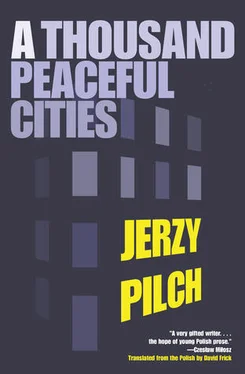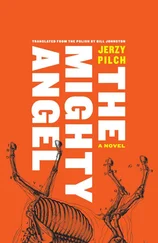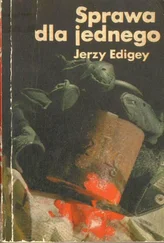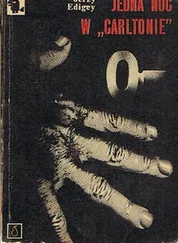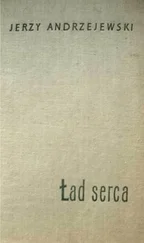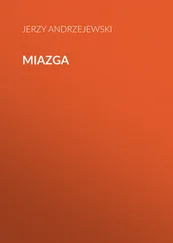“Mr. Trąba,” in Father’s voice curiosity vied with irritation, “how, by God the Father, do you know all these pieces of information?”
“I drew them from the same source where you, Chief, draw so much knowledge.” Smiling playfully, Mr. Trąba tapped his index finger on the huge sheet of newspaper that was spread out on the table. “I read this between the lines of The People’s Tribune .”
“Mr. Trąba,” Father said with a smile that was full of admiration, “if it weren’t for the fact that we are on duty, I would pronounce the ritual formula: that this is a beautiful phrase, and worthy of reward. This is one of your most splendid ripostes. You have my esteem.”
“A thousand thanks, Chief. That’s right. We’re on duty, and there can be no talk of even a drop of alcohol. On the other hand, however, I have to say that I would feel a particular distress if one of my most subtle lines went without the reward it deserves, even if it were to have a somewhat smaller measure, let’s say half. Second, the hour is so late that we can accept the notion that the proverbial glass takes on the function of the bracing mocha. Third, and most important, it is time, I believe, that the youngest participant in the action,” Mr. Trąba clearly pointed in my direction, “attained knowledge of our secrets and initiation.”
Father remained silent and didn’t budge from the spot.
“Chief,” Mr. Trąba said with his official voice, one well trained in its officialness, “what you heard wasn’t the empty twaddle of your friend, rather the voice of your superior and the commander of this action. Have the goodness to appreciate the fact that, bearing your merits in mind, I do not use the word ‘order,’ but I also ask that such acts of insubordination not be repeated in the future.”
Father obediently stood up from the table, went up to the sideboard, took out a bottle and glasses, and placed them on the table.
“Come, Jerzyk,” Mr. Trąba beckoned in my direction, and I entered into the inky abyss of the kitchen on trembling legs.
I was certain that I would immediately hear the ghastly word “child.” “Please don’t involve the ‘child’ in this,” Father would immediately say, or “The ‘child’—absolutely not,” or “The ‘child’ should be sleeping by now,” or “He’s still a ‘child.’” But Father filled the glasses in silence. I sat down slowly on the white lacquered stool, which now was as if coated with a light blue varnish. And Mr. Trąba spoke further:
“Jerzyk, my man! That you are a man is universally known.” Could it be that he knew what I had been up to with the angel of my first love? The panicky thought flashed through my head, but Mr. Trąba was clearly not interested in concrete details. “We will not, therefore, repeat the obvious and thereby trivialize the beginning of the ritual. Namely, as a man, Jerzyk, together with other men (contrary to appearances both your Father and I still deserve that appellation), you will have the chance to participate in a great patriotic act. But as a child”—there you have it! I thought, there you have it! I have divine gifts and outpace reality by at least half a step—“for, after all, even being a man, you still are — and what is more, you always will be — a child in various ways, if only in the sense of being the child of your parents; and so, as a child, Jerzyk, you will have a completely unique opportunity, which, already at the very beginning of life, will put you in an incredibly privileged position. Namely, as a child, Jerzyk, you will have the chance to crush the serpent’s brow:
‘Who, yet an infant, crushed the serpent’s brow,
In youth will choke the centaur’s breath,
Snatch victims forth from hell below,
And win heaven’s laurels after death!’”
Mr. Trąba recited carefully, placing each accent and pause in its appropriate place. “Whether in your further life you skillfully exploit the opportunity given you, that is, whether you will choke, snatch, and win what you ought — that, Jerzyk, is your business. We are giving you the sort of opportunity that none of your cohort has. But now, raise your glass, Jerzyk.” From the beginning of his oration, Mr. Trąba had held his glass behind the safe enclosure of his fingers. “And now, raise your glass and drink. We all know, gentlemen,” Mr. Trąba arose and we with him, “what the first sip of alcohol means in the life of a man. Jerzyk, in order to avoid choking like a debutant, an image so favored in second-rate literature, proceed according to the following method: just before drinking, take in a modest amount of air — in other words, inhalation; then, drink up in one gulp, not breathing out, of course — in other words, non-halation; then, delicately but decidedly release the air — in other words, exhalation. This is the point: after drinking schnapps you must release the air from the body in order to make room there for more of it. Gentlemen — Jerzy, Stanisław,” Mr. Trąba clinked glasses with us, and Father and I did the same, we clinked our glasses, “gentlemen, let the head of the tyrant fall. To our health and to the health of all our tyrannicidal colleagues, living and dead.”
And we drank. And I drank. And it went as smoothly as could be. The transparent cloud of juniper berry vodka threaded its way among the shadows of my entrails, and there were upon it signs and prophecies, and there were in this first sip of mine the prefigurations of all my future sips. Recorded in it were all my future falls, bouts of drunkenness, bottles, glasses, retchings, all my future delirious dreams, all my gutters, counters, tables, bars, all the cities on the pavement of which my corpse would once repose. There were all the waitresses with whom I would place orders in my life. You could hear in it my incoherent babble, and in it my hands shook. Even my death, shrouded in a cloak made of nothing but bottle labels, sat there and laughed terribly, but I wasn’t afraid in the least. And so I drank. The first power entered into me, and together with it came the first great bestowal of wings. I was able to do everything now. With one action I was able to solve a thousand complicated equations. With one motion I was able to summon a thousand protective angels. With one kick I could kick a thousand goals. With one gesture of my powerful hand, with one finger, I could grind Władysław Gomułka to dust. I glanced at the faces of Father and Mr. Trąba, masked with a light-blue glow, and I knew that the same mask graced my face, that on my hands (just as on theirs) were the light-blue gloves of the conspirator. I recalled Sexton Messerschmidt telling the story of divine sparks, light-blue like a gas flame. I looked with rapture at my hands, which were now not only the hands of the born bell-ringer, but also the hands of the hired murderer, mercenary, marksman.
“And if by some miracle I should succeed,” Mr. Trąba’s voice returned a feeling of duty to me, “even if by some miracle I should succeed, and if I should manage to get into his immediate proximity, I wouldn’t be able to do it from close quarters anyway. I wouldn’t strike him down with a stiletto, to say nothing of doing it with my bare hands. The physical repugnance that I feel for Comrade Wiesław would certainly paralyze me. With my bare hands I could destroy Comrade Mao. Gomułka — absolutely not. And besides, it’s easier to kill from a distance. .”
“It’s easier to kill from a distance from the moral point of view, harder from a technical point of view.” Father very rarely formulated such general maxims.
“Chief,” Mr. Trąba shouted enthusiastically, “I am madly envious of the accuracy of that formulation. I’m madly envious, and at the same time I reward you.”
Mr. Trąba filled the glasses — mine, however, he filled only half way, which hurt me terribly. The venomous thought of desertion and betrayal immediately flashed through my mind.
Читать дальше
